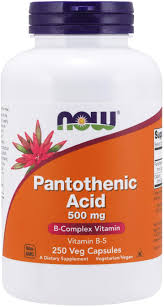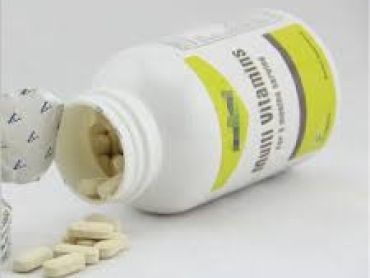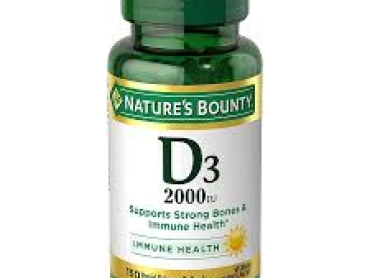Firstly Vitamin B5 Pills Pantothenic Acid supports metabolism and protects the heart, skin, and eyes. Secondly it builds coenzyme A and helps regenerate skin cells. Still, its potential benefits lack solid clinical evidence. Read on to learn the health benefits, sources, and dosage of pantothenic acid.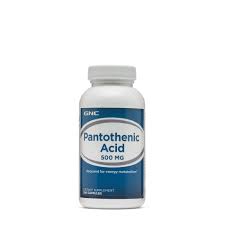
What is Pantothenic Acid?
Generally It helps convert food into energy by supporting the metabolism of carbs, protein, and fats. Additionally, it is important for the immune, nervous, and gastrointestinal system.
It is also a precursor for coenzyme A (CoA), which enables different enzymatic pathways .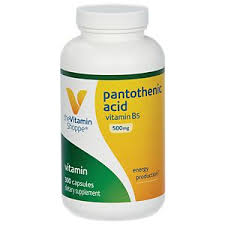
Topically, pantothenic acid is used in cosmetic products and eye drops. This is due to its skin-regenerating properties.
On the other hand Vitamin B5 is sold under many different names as a supplement: D-pantothenic acid, dexpanthenol, zinc pantothenate, and calcium pantothenate.
Snapshot
Proponents:
- Aids metabolism of fats and carbohydrates
- May lower cholesterol levels
- Protects the heart
- May reduce stress
- Soothes the skin and eyes
Skeptics:
- All benefits lack solid clinical evidence
- May not help with skin irradiation
- Higher doses may cause nausea
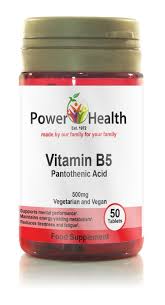
Health Benefits of Vitamin B5 Pantothenic Acid
Possibly Effective:
1) Nasal Congestion and Inflammation
In a pilot study of 50 children with allergic rhinitis, a nasal spray with D-panthenol (also included lactoferrin, carboxymethyl-glucan and dipotassium glycyrrhizinate) effectively reduced the symptoms of allergic rhinitis, including nasal congestion .
A spray with dexpanthenol, an analog of pantothenic acid, reduced nasal obstruction, crust formation, and throat inflammation in 48 patients.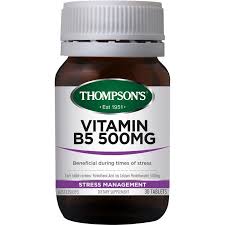
In 50 patients with chronic nasal and sinus inflammation (rhinosinusitis), a different spray with dexpanthenol reduced nasal discharge but not other symptoms after endoscopic sinus surgery.
Insufficient Evidence:
No valid clinical evidence supports the use of pantothenic acid for any of the conditions in this section. Below is a summary of up-to-date animal studies, cell-based research, or low-quality clinical trials which should spark further investigation. However, you shouldn’t interpret them as supportive of any health benefit.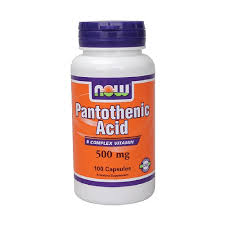
2)Vitamin B5 Pantothenic Acid In Heart Disease
Pantethine (a derivative of Vitamin B5, 600-900 mg/day for 16 weeks) slightly but significantly reduced total and LDL cholesterol in a study of 120 adults.
The same group of researchers observed these results in a similar trial with 32 subjects.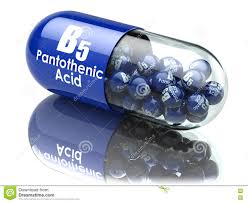
However, both trials were funded by the company that sells pantethine, which indicates a potential conflict of interest.
In another study of 182 patients, different forms of vitamin B5 (300-500 mg/day) supported the treatment of heart disease by improving metabolism and blood lipids.
Well-designed, unbiased clinical trials should investigate the effects of pantothenic acid and its derivatives on heart health.
3) Vitamin B5 Pantothenic Acid In Skin Irritation
Secondly in two trials, dexpanthenol reduced skin water loss, skin roughness, and skin inflammation due to sodium lauryl sulfate (SLS) exposure. .
However, it wasn’t able to prevent SLS-induced skin irritation in another study in 25 volunteers [.
Thirdly Dexpanthenol speeded up the wound healing and repaired skin cells in test tubes.
4) Vitamin B5 Pantothenic Acid In Eye Protection
Generally Artificial tears with vitamin B5, in the form of dexpanthenol, reduced pain and discomfort in a trial of 50 patients with dry eye.
In the same vein Dexpanthenol 5% drops and gel showed similar benefits and enhanced wound healing following eye surgery in 40 patients .
However, it had insignificant benefits on eye wound healing in another trial of 18 patients.
5) Stress Tolerance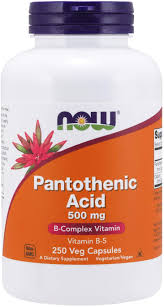
According to one review of human and animal studies, pantothenic acid, along with other B vitamins and adaptogenic herbs, may minimize some of the negative effects of stress .
However More research is needed before jumping to conclusions.
Possibly Ineffective:
Skin Irradiation
Despite its skin-protective effects, dexpanthenol doesn’t seem to provide significant relief from skin damage due to radiotherapy.
Sources of Vitamin B5 Pantothenic Acid
Vitamin B5 is found in different foods like meat (beef, fish, lobster pork, chicken), sunflower seeds, dairy products (yogurt, milk, cheese, etc) eggs, avocado, sweet potato .
Bacteria in the large intestine can naturally produce calcium pantothenate. Human breast milk also contains pantothenic acid.
Dosage Vitamin B5 Pantothenic Acid
The following doses of pantothenic acid (vitamin B5) are recommended daily:
- 1.7 mg for infants younger than six months
- 1.8 mg for infants 6-12 months
- 2 mg for children 1-3 years
- 3 mg for children 4-8 years
- 4 mg for children 9-13 years
- 5 mg for 14 years and older
- 6 mg for Pregnant women
- 7 mg for Breastfeeding women



